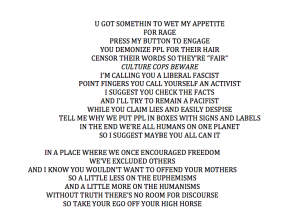Something I’ve recently started to get into is making zines. Zines are the perfect little multimedia projects I’ve been searching for. Short for “magazine”, they are tiny little DIY self-publications. They are usually reproduced using a photocopier, although in the digital age, you can find a lot of zines swimming around the interwebs. They usually contain drawings/doodles/poetry/photography/etc. and they almost always have a political agenda or outlook. However, I’ve stumbled across many-a-zine that are extremely personal and have nothing political about them (I’ve also made a few of these myself).
There is something so raw about zines. They are supposed to be rough around the edges—they aren’t supposed to be polished. I think Ben Franklin might have created the first zine, which was meant for staff at a psychiatric hospital. Zines are also really important to the riot grrl feminist movement. I think the best ones are the collaborative ones, the ones where you get as many different hands in the pot as possible. So that’s why I want to maybe propose making a zine together—anyone who is interested! I also have a few that I am working on now that are still not finished and looking for submissions. A current zine I am working on focuses on political correctness, and tries to take a stab at some questions like, “is social media really conducive for real political discourse?”, “where do we get our information from”, and things along those lines. Here is a rap/poem that was written for it:
The cool thing about zines though is that it can be a little all over the place! Someone sent me some poems that she wrote using her Iphone autocorrect function, and though that may not fit 100% with the aim of the zine, I still want to include it because it does probe at some interesting thoughts regarding technology and communication in general.
Also, I recently put together an audio zine with a friend of mine, Alex McGrath, that is sort of a conglomerate of speech, audio clips, spoken word poetry, and other sounds that you can check out here: https://autozone.bandcamp.com if you want!
If any of this sounds at all interesting to you, let me know if you have anything to contribute or have an idea for a new zine, I’d love to collaborate on some work!

